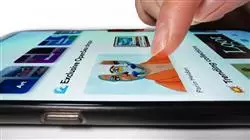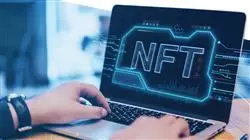University certificate
The world's largest faculty of information technology”
Introduction to the Program
Learn now how to create a project based on Digital Assets and take advantage of business opportunities with the most complete Postgraduate diploma in the current academic panorama"

Tokenization and NFTs have changed the digital landscape by offering new ways to represent, exchange and monetize assets. These technologies have democratized access to investment and empowered digital creators, while promoting transparency, authenticity and decentralization in the digital world.
These new forms of digital economy have rapidlya expanded to various fields, such as digital art, music, video games, sports, among others. Over time, artists, musicians, collectors and creatives have begun to use non-fungible tokens as a way to authenticate and directly sell their digital works without intermediaries.
Therefore, the role of the computer scientist becomes crucial, as mastering Tokenization and NFTs is essential in the monetization of goods. For this reason, TECH has developed this Postgraduate diploma with a duration of 6 months, which has the most up to date content and has been elaborated by experts in the sector. The program will therefore provide participants with a detailed understanding of asset tokenization, from its conception to its commercialization and valuation, giving them the necessary tools to understand and participate in this constantly evolving field.
This is a unique academic qualification that offers high quality multimedia materials, including interactive summaries, quick action guides and specialized readings. Besides, thanks to the implementation of the Relearning method, which consists of the reiteration of TECH, IT professionals will advance smoothly, assimilating new concepts more easily and reducing the extensive hours of study.
This is an exceptional opportunity that will allow students to be at the forefront in the Tokenization of rights and will open doors to better career opportunities. In addition, they will have the flexibility to coordinate their daily activities and work responsibilities, since they will be able to access the program from anywhere and at any time, they will only need an electronic device with an Internet connection.
You will explore new ways of investing and financing in the digital era of Tokenization"
This Postgraduate diploma in Tokenization and NFTs contains the most complete and up-to-date program on the market. The most important features include:
- The development of practical cases presented by experts in finance and Blockchain
- The graphic, schematic and practical contents of the book provide technical and practical information on those disciplines that are essential for professional practice
- Practical exercises where the self-assessment process can be carried out to improve learning
- Its special emphasis on innovative methodologies
- Theoretical lessons, questions to the expert, debate forums on controversial topics, and individual reflection work
- Content that is accessible from any fixed or portable device with an Internet connection
You will be prepared to be part of the future of digital property, gaining skills to participate in the creation, management and trading of assets"
The program’s teaching staff includes professionals from the field who contribute their work experience to this educational program, as well as renowned specialists from leading societies and prestigious universities.
The multimedia content, developed with the latest educational technology, will provide the professional with situated and contextual learning, i.e., a simulated environment that will provide immersive education programmed to learn in real situations.
This program is designed around Problem-Based Learning, whereby students must try to solve the different professional practice situations that arise throughout the program. For this purpose, the students will be assisted by an innovative interactive video system created by renowned and experienced experts.
Dive into the universe of NFTs and you will discover how these tokens are transforming industries such as art"

You will discover the security measures for the protection of blockchains in digital finance"
Why study at TECH?
TECH is the world’s largest online university. With an impressive catalog of more than 14,000 university programs available in 11 languages, it is positioned as a leader in employability, with a 99% job placement rate. In addition, it relies on an enormous faculty of more than 6,000 professors of the highest international renown.

Study at the world's largest online university and guarantee your professional success. The future starts at TECH”
The world’s best online university according to FORBES
The prestigious Forbes magazine, specialized in business and finance, has highlighted TECH as “the world's best online university” This is what they have recently stated in an article in their digital edition in which they echo the success story of this institution, “thanks to the academic offer it provides, the selection of its teaching staff, and an innovative learning method aimed at educating the professionals of the future”
A revolutionary study method, a cutting-edge faculty and a practical focus: the key to TECH's success.
The most complete study plans on the university scene
TECH offers the most complete study plans on the university scene, with syllabuses that cover fundamental concepts and, at the same time, the main scientific advances in their specific scientific areas. In addition, these programs are continuously being updated to guarantee students the academic vanguard and the most in-demand professional skills. In this way, the university's qualifications provide its graduates with a significant advantage to propel their careers to success.
TECH offers the most comprehensive and intensive study plans on the current university scene.
A world-class teaching staff
TECH's teaching staff is made up of more than 6,000 professors with the highest international recognition. Professors, researchers and top executives of multinational companies, including Isaiah Covington, performance coach of the Boston Celtics; Magda Romanska, principal investigator at Harvard MetaLAB; Ignacio Wistumba, chairman of the department of translational molecular pathology at MD Anderson Cancer Center; and D.W. Pine, creative director of TIME magazine, among others.
Internationally renowned experts, specialized in different branches of Health, Technology, Communication and Business, form part of the TECH faculty.
A unique learning method
TECH is the first university to use Relearning in all its programs. It is the best online learning methodology, accredited with international teaching quality certifications, provided by prestigious educational agencies. In addition, this disruptive educational model is complemented with the “Case Method”, thereby setting up a unique online teaching strategy. Innovative teaching resources are also implemented, including detailed videos, infographics and interactive summaries.
TECH combines Relearning and the Case Method in all its university programs to guarantee excellent theoretical and practical learning, studying whenever and wherever you want.
The world's largest online university
TECH is the world’s largest online university. We are the largest educational institution, with the best and widest online educational catalog, one hundred percent online and covering the vast majority of areas of knowledge. We offer a large selection of our own degrees and accredited online undergraduate and postgraduate degrees. In total, more than 14,000 university degrees, in eleven different languages, make us the largest educational largest in the world.
TECH has the world's most extensive catalog of academic and official programs, available in more than 11 languages.
Google Premier Partner
The American technology giant has awarded TECH the Google Google Premier Partner badge. This award, which is only available to 3% of the world's companies, highlights the efficient, flexible and tailored experience that this university provides to students. The recognition as a Google Premier Partner not only accredits the maximum rigor, performance and investment in TECH's digital infrastructures, but also places this university as one of the world's leading technology companies.
Google has positioned TECH in the top 3% of the world's most important technology companies by awarding it its Google Premier Partner badge.
The official online university of the NBA
TECH is the official online university of the NBA. Thanks to our agreement with the biggest league in basketball, we offer our students exclusive university programs, as well as a wide variety of educational resources focused on the business of the league and other areas of the sports industry. Each program is made up of a uniquely designed syllabus and features exceptional guest hosts: professionals with a distinguished sports background who will offer their expertise on the most relevant topics.
TECH has been selected by the NBA, the world's top basketball league, as its official online university.
The top-rated university by its students
Students have positioned TECH as the world's top-rated university on the main review websites, with a highest rating of 4.9 out of 5, obtained from more than 1,000 reviews. These results consolidate TECH as the benchmark university institution at an international level, reflecting the excellence and positive impact of its educational model.” reflecting the excellence and positive impact of its educational model.”
TECH is the world’s top-rated university by its students.
Leaders in employability
TECH has managed to become the leading university in employability. 99% of its students obtain jobs in the academic field they have studied, within one year of completing any of the university's programs. A similar number achieve immediate career enhancement. All this thanks to a study methodology that bases its effectiveness on the acquisition of practical skills, which are absolutely necessary for professional development.
99% of TECH graduates find a job within a year of completing their studies.
Postgraduate Diploma in Tokenization and NFTs
Discover the exciting world of tokenization and NFTs with our Postgraduate Diploma in TECH Global University of Technology. Take this opportunity to step into the cutting edge of technology and learn about online classes designed to give you the knowledge and skills you need in this constantly evolving field. Tokenization and NFTs have revolutionized the way we interact with digital assets. With our Postgraduate Diploma program, you will gain an in-depth understanding of the concepts and applications of tokenization, as well as how NFTs (non-fungible tokens) work and their impact on different industries, such as art, video games and music.
Specialize with TECH in what's new in the world of work
Online classes offer you the flexibility to study from anywhere and at any time that best suits your pace of life. You'll be able to access course materials, participate in interactive discussions and receive feedback from experts in the field, all from the comfort of your home. Our Postgraduate Diploma program in Tokenization and NFTs will give you a solid theoretical and practical foundation. You will learn about token creation, issuance and management, as well as the legal and economic implications of this technology. In addition, you will explore real use cases and study the latest trends and developments in the world of tokenization and NFTs. At TECH Global University, we are proud to offer innovative academic programs that prepare you for the digital future. If you are interested in acquiring specialized knowledge in tokenization and NFTs, don't miss this opportunity to specialize with the best experts in the field. Enroll now in our Postgraduate Diploma in Tokenization and NFTs and become a leading professional in this exciting area!







